 Memories
Memories 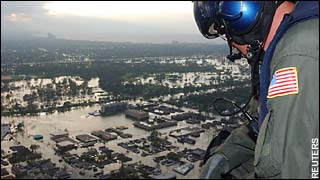
a means to recover meaning from the distress of this life.
story | Andrei Codescru's commentary | terms | flood photo | media distortion | visuals | Personal note
New Orleans, 2005.
"It was the end of a very long day and the beginning of a long and life-altering year for the residents of New Orleans and for our country."
Billy Sothern, Down in New Orleans, 2006.
"We drove north into Mississippi as the late summer Sabbath sun rose over New Orleans."
p. 5.
"I had moved from New York about four years earlier to live in New Orleans and do social justice work in the cracks of the edifice erected in the wake of the civil rights movement."
p. 6.
story | Andre Codescru's commentary | terms | flood photo | media distortion | visuals | Personal note
Fellow lawyers from all over the world who worked with him:
"they were shocked by the racism and poverty they saw on a daily basis."
"It is a soup-to-nuts tour of human misery and, for our visitors from overseas, it is distinctly American."
p. 7.
"allowed me to see my own homeland with fresh eyes"
p. 8.
"I occupied a speck of space and time in a home and a city where the difficult aspects of American history spread out in every direction."
p. 9.
"As the storm barreled toward our city, a storm that ultimately killed more than a thousand people."
p. 10.
Central City. . .had been a center of Jewish life in the city until New Orleans fell apart in the 1960s."
p. 10.
"My wife. . . and I,. . . finally had a home of our own-- a beautiful place that we had made ourselves in a city we loved, all the while struggling to make the city better for the people who had not had a choice about living there."
"Maybe this was why I was so reluctant to leave when I heard of coming storms."
p. 11.
"All we had left to do was despair"
"This could well be the worst natural disaster in the nation's history."
p. 25.
story | Andre Codescru's commentary | terms | flood photo | media distortion | visuals | Personal note
Andrei Codrescu, The New Orleans writer's NPR monologue is quoted:
"So here we are sinking into the waters around us, drowning in our own waste, poverty, incompetence, and the greed of those who came before us. This is a time for straight reporting, of heartbreaking stories, of heroic rescues and super-human efforts by good hearted individuals and the weary but ever ready charities. It's not a time for anger. But I can't help wondering, what is going to survive of our culture? We already know who is going to pay for all this. The poor. They always do. The whole country's garbage flows down the Mississippi to them. Until now, they turned all that waste into song. They took the sins of America onto themselves, but this blues now is just too big."
pp. 30-31.
This tragedy is just too deep
"When you feel like doing something nice. . . you feel like you have the courage to do it."
Abdulramman Zeitoun, victim and angel during the deluge.
p. 93.
He returns to the city (home is on Carondollet above St. Charles Street) his wife is an artist, he gad given talks in NYC as to the failures in New Orleans, which he felt were revealed by -- not caused by the deluge after Katrina. His father is a mold specialist who went from NYC to N. O. to assist with people removing toxic mold from their water-soaked homes.
They return together at the end of October 2005, to repair their homes and restore their lives.
story | Andre Codescru's commentary | terms | flood photo | media distortion | visuals | Personal note
Media distortion
Is an account of the 150th Mardi Gras, following the krewes, Muses and Ninth Ward bands; critical of the New York Times report -- mistaken about the Ninth Wards artists and musicians.
p. 233-241.
"Especially in an article that was centered on the tragedy of the changing cultural landscape of the city, it was disappointing and ironic to see the 'national paper of record' dismiss a cultural community of long standing simply because it did not correspond to a notion, born of ignorance, about the cultural and geographical complexity of the city's neighborhoods."
p. 240.
"we shall never forget"
p. 240.
"Saint Anne's parade -- different because it does not distinguish between participants and spectators and flows through the Creole neighborhoods into the French Quarter."
p. 241-242.
we must
"restore gentleness to this ravaged land."
story | Andre Codescru's commentary | terms | flood photo | media distortion | visuals | Personal note
"Happy is he whom the Muses love, sweet flows speech from his mouth."
Hesiod
Too close to the levee for comfort.
Iron and concrete materials revealed in the repair of this breeched flood wall the close proximity of people and Lake Ponchartrain, whose waters destroyed this, once prosperous, home.
Significant parts of the city --divided into parishes for administrative purposes-- occupy low lying areas beside the Lake. The land there was reclaimed from swamps that once drained were rimmed along by levees to keep the Lake's water from re-flooding the bowl.
Thus after the Civil War these swamps and lowlands that were inhospitable to development for most of the nineteenth century, yet they became the prime places for expansion after World War Two. It has been the responsibility of the Army Corps of Engineers, at the behest of Congress, local elected officials, and public levee boards to protect the city from floods.
story | Andre Codescru's commentary | terms | flood photo | media distortion | visuals | Personal note
Defining terms
responsibility to respond in some way that admits to having some capacity for accountable and dependable behavior in a situation where people require some sort of assistance. The opportunity to make decisions and take action.
Cassandra the daughter of King Priam and princess of Troy who knew, before the tragic defeat, the outcome of the Trojan War and thus was doomed to be ignored by Greeks and Trojans alike. One who brings bad news and is denied respectability.
civil rights those privileges and immunities to which every resident born or naturalized in the US are deserving due to their citizenship. Explicit protection afforded to citizens by the Bill of Rights, Congress, and courts of law.
race the term erroneously given in the eighteenth and later centuries to ethic identity based largely on physical characteristics such as complexion, facial features, and ancestry. Believed during the nineteenth century to be a special category peoples comprising the human race which was subdivided into three "races" -- the Negroid, Caucasoid, and Mongolian-- largely unsubstantiated by scientific and genetic evidence, race --nonetheless-- is a social stigmatizing of people because of their skin color and other exterior features.
race and poverty, the relation, especially in urban America, between being non-white and having far less income and wealth, access to police protection, schools, and health care than do most of the white population.
demography of poverty, one fourth of all New Orleans residents live at or below the poverty level.
story | Andre Codescru's commentary | terms | flood photo | media distortion | visuals | Personal note
Federal Emergency Management Administration --FEMA-- policy
"Big campaign money buys special access. . . "
John Dean, Worse than Watergate. p. 76.
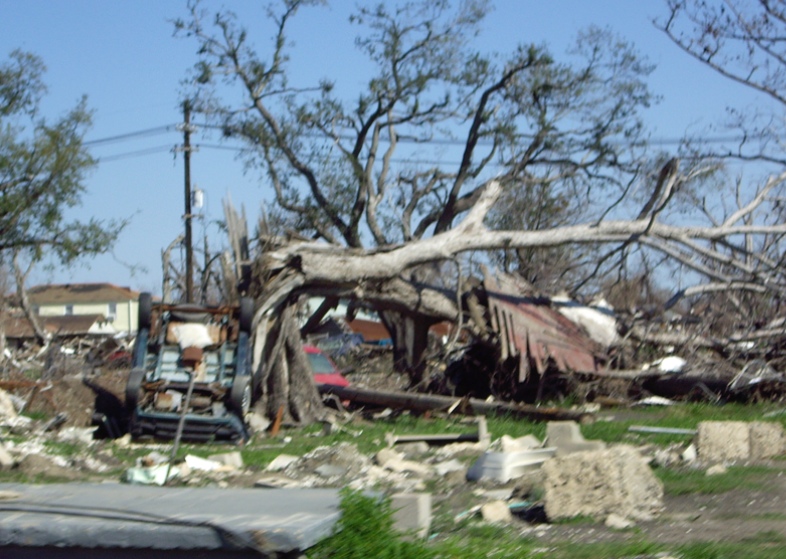
When the flood walls and levees failed material possessions and natural objects together rested in a common graveyard. Lower Ninth Ward: March, 2006; JVS.
story | Andre Codescru's commentary | terms | flood photo | media distortion | visuals | Personal note
Context
Essay:
Memoir of New Orleans
This tragedy is just too intense and too lingering not to sense a profound despair in your stomach and feel the tension intensify in the heart of your chest. The debris of people's lives, sullied in the waste water of a civilization, suspended in time without electrical lighting, refrigeration, or even a modest Gulf Breeze for respite, hangs all over my memory like obstructing kudzu vines stilling my imagination's search for reason's light to explain the loss of a people, their belongings and their homes.
I first saw New Orleans when I was a child of ten in the oppressively hanging heat of a stifling August summer. And I first saw the 2005 flood's aftermath in March 2006 ( a full six months after the storm ) following the Katrina and Rita sister hurricanes some forty six years later. The spectacle was beyond imagining, the devastation was beyond easy calculation, and the loss inestimable --though nearly two thousand people perished.
Abandoned dwellings everywhere in the wake of breeched levees mingled with the empty stores and still streets punctuated by unlit traffic signals for miles on miles of suburban neighborhoods beside the sea they call Lake Ponchartrain. After and hour driving empty neighborhoods and abandoned shopping centers, we crossed the bridge from the upper to the lower ninth ward. It was as if I was in Banda Ache, Indonesia after the Christmas tsunami, because there was not a single wooden structure that had not somehow been moved off its foundations, if not obliterated by the failing levees, the crushing barges, and unending watery surges that swept away the structures into which human lives had hoarded and saved the meaningful possessions of generations.
Whatever hopes these homes had harbored were now strewn like so many of the private possessions spread out across the muddied ground, sullied by the no longer private gazes of casual visitors like me. Anyone could peer into the secret mementoes and souvenirs of these once passionate and opinionated residents. I was as Dante had said of those about to enter the inferno ready to "abandon all hope, ye who enter here." As I stared into the twisted wooden clapboard sidings and plaster board that had once kept lives together, I realized these broken televisions, disabled toilet seats, stained wedding albums, LP records, radios and cracked graduation photographs would always recall for me this remorseless hell of our own human-making.
For it is not the natural disaster that I detect in the wreckage of these cars, trucks, homes, groceries, stores, and schools that lay scattered before my eyes. Instead, each of these personal appliances or private possessions spilling across undistinguishable property lines represented for me the failure. That is a nation's, a region's, a state and its communities' failure to keep up even optimal repairs to the flood walls and levees that any civilized person would understand are necessities of life for those who dwell below the waters of the Mississippi River and the Gulf of Mexico.
No this was a human tragedy; created and perpetuated now by a government of the people, for the people and by the people. As if in some great mass delusion, we as an intelligent and compassionate people had allowed repair work and precautionary capital improvements to pile-up without regards for the ultimate consequences of neglect. That is a loss of life, liberty and property that I now saw everywhere around me.
For three hundred and sixty degrees of arc, anywhere and in every direction I turned, I could not find a place free from devastation. No photo in its reassuring frame could reveal the scope, intensity and duration of this torturous expanse of extinguished neighborhoods, distraught families and drowned dreams. Nothing in my experience prepared me for what I now sensed was not the aftermath of a nightmare but instead the lingering dread of a daydream from which there is no way to reemerge.
The tragic sense of these scenes of one grueling interlude after another remains with me, informs my fears, and forces me admit there are no good reasons why this storm snuffed out desire. I have even fewer rationales for why the lurid aftermath lumbers imperceptibly still from one unjust conclusion to another.
739 words
1:09:45 PM PST, Tuesday, December 25, 2007, Mammoth Lakes Ca.
I wrote this essay after reading Billy Sothern’s Down in New Orleans, his recollection of the storm that changed him and his city and our nation. He is a civil rights lawyer from NYU who came to work with death penalty victims, (like a friend of mine John in Gainesville, Fl) just before September 11, 2001.
J. Siry
story | Andre Codescru's commentary | terms | flood photo | media distortion | visuals | Personal note | sources
Sources
Billy Sothern’s Down in New Orleans, Berkeley: U. of California Press. 2006
Michael Grunwald, The Threatening Storm, Time Magazine, August 13, 2007, pp, 28-39.*
Fischetti, Mark, “Drowning New Orleans,” Scientific American, October 1, 2001. (Sciam.com)
Date: 19 November 2007
story | Andre Codescru's commentary | terms | flood photo | media distortion | visuals | Personal note

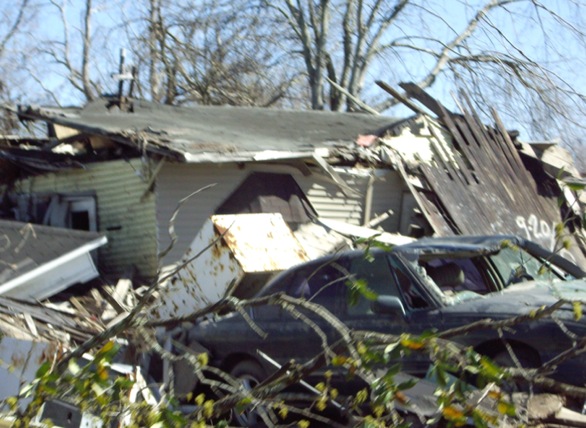
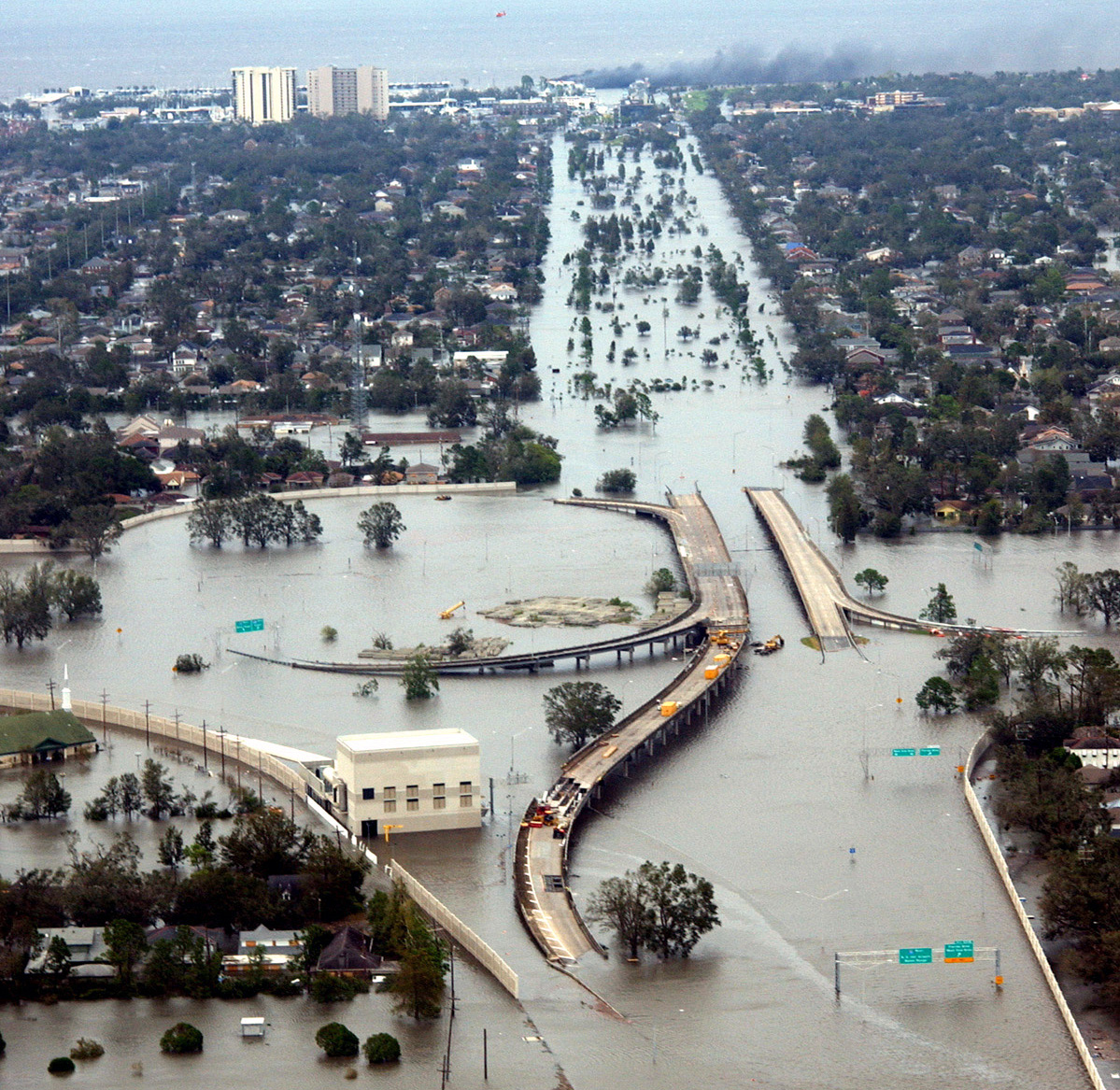
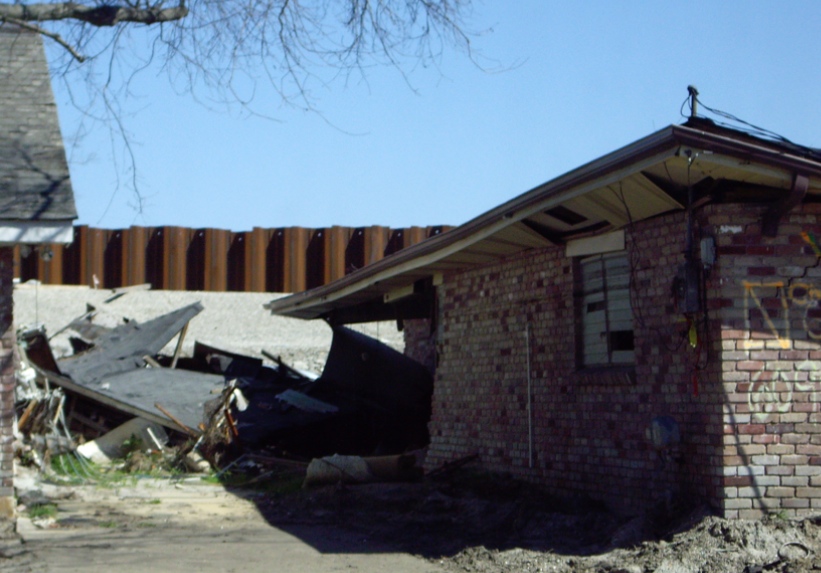

 study Guide
study Guide 